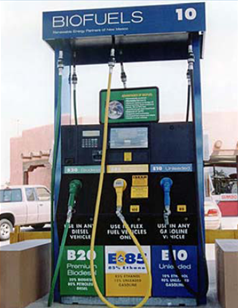Alternative fuels are fuels that can replace or displace fossil fuels and that may have some desirable energy efficiency and pollution reduction features.

The U. S. Government Administration and Congress have mandated the production and usage of alternative fuels to help reduce our nation's reliance on foreign petroleum and to help improve air quality. In his 2007 State of the Union Address, President Bush outlined his proposal to increase the supply of renewable and alternative fuels by setting a mandatory fuels standard to require 35 billion gallons of renewable and alternative fuels by 2017.
The Energy Independence and Security Act of 2007 was signed into law on December 19, 2007. This Act increases the supply of alternative fuel sources by modifying the Renewable Fuel Standard (RFS) to require fuel producers to use at least 36 billion gallons of biofuel by 2022. Under the RFS fuel refiners, blenders, and importers are required to use a minimum volume of renewable fuel each year; the minimum volume for each company is determined as a percentage of the total volume of motor-vehicle fuel that a company produces or imports.
To make alternative fuels widely available they must be produced in sufficient quantities and must be transported from production centers to areas of use. Energy transmission pipelines may transport alternative fuels once sufficient quantities are gathered together near pipeline entry points and justify transportation economics. This is much the same as the transportation requirements for petroleum products and natural gas. Entry and expansion of pipelines into alternative fuels transportation will change the evolution of their usage and direct where infrastructure investments are made.
Pipeline Transportation of Alternative Fuels
Pipeline transportation requirements of alternative fuels differ by the fuel type. The following fuels are currently recognized in some levels of discussion by PHMSA in its federal and public enterprise.
PHMSA’s Role in Alternative Fuels Transportation – PHMSA is the primary Federal Administration responsible for ensuring that all energy pipelines are safe, reliable, and environmentally sound. PHMSA’s regulatory jurisdiction enables it to aggressively address issues related to the transportation of alternative fuels in pipelines.
